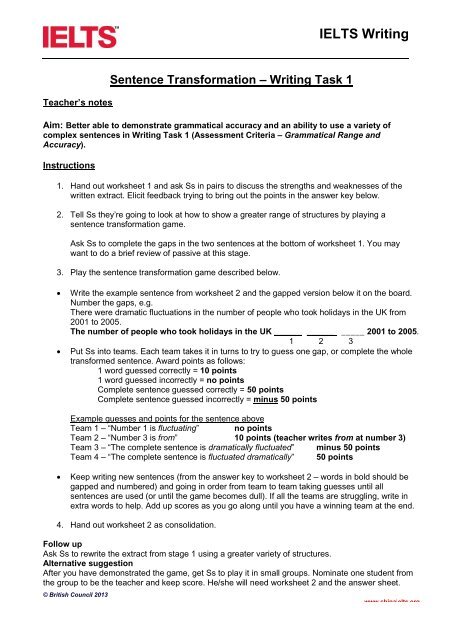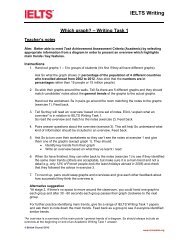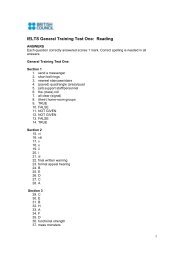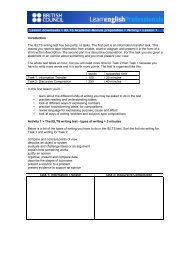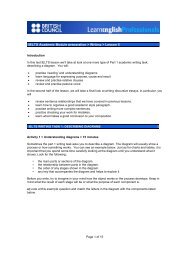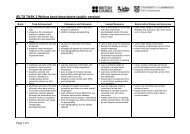IELTS Writing
Writing Task 1 - Sentence transformation - Take IELTS - British Council
Writing Task 1 - Sentence transformation - Take IELTS - British Council
- No tags were found...
Create successful ePaper yourself
Turn your PDF publications into a flip-book with our unique Google optimized e-Paper software.
<strong>IELTS</strong> <strong>Writing</strong><br />
Teacher’s notes<br />
Sentence Transformation – <strong>Writing</strong> Task 1<br />
Aim: Better able to demonstrate grammatical accuracy and an ability to use a variety of<br />
complex sentences in <strong>Writing</strong> Task 1 (Assessment Criteria – Grammatical Range and<br />
Accuracy).<br />
Instructions<br />
1. Hand out worksheet 1 and ask Ss in pairs to discuss the strengths and weaknesses of the<br />
written extract. Elicit feedback trying to bring out the points in the answer key below.<br />
2. Tell Ss they’re going to look at how to show a greater range of structures by playing a<br />
sentence transformation game.<br />
Ask Ss to complete the gaps in the two sentences at the bottom of worksheet 1. You may<br />
want to do a brief review of passive at this stage.<br />
3. Play the sentence transformation game described below.<br />
∑<br />
∑<br />
Write the example sentence from worksheet 2 and the gapped version below it on the board.<br />
Number the gaps, e.g.<br />
There were dramatic fluctuations in the number of people who took holidays in the UK from<br />
2001 to 2005.<br />
The number of people who took holidays in the UK ______ ______ _____ 2001 to 2005.<br />
1 2 3<br />
Put Ss into teams. Each team takes it in turns to try to guess one gap, or complete the whole<br />
transformed sentence. Award points as follows:<br />
1 word guessed correctly = 10 points<br />
1 word guessed incorrectly = no points<br />
Complete sentence guessed correctly = 50 points<br />
Complete sentence guessed incorrectly = minus 50 points<br />
Example guesses and points for the sentence above<br />
Team 1 – “Number 1 is fluctuating” no points<br />
Team 2 – “Number 3 is from” 10 points (teacher writes from at number 3)<br />
Team 3 – “The complete sentence is dramatically fluctuated” minus 50 points<br />
Team 4 – “The complete sentence is fluctuated dramatically” 50 points<br />
∑<br />
Keep writing new sentences (from the answer key to worksheet 2 – words in bold should be<br />
gapped and numbered) and going in order from team to team taking guesses until all<br />
sentences are used (or until the game becomes dull). If all the teams are struggling, write in<br />
extra words to help. Add up scores as you go along until you have a winning team at the end.<br />
4. Hand out worksheet 2 as consolidation.<br />
Follow up<br />
Ask Ss to rewrite the extract from stage 1 using a greater variety of structures.<br />
Alternative suggestion<br />
After you have demonstrated the game, get Ss to play it in small groups. Nominate one student from<br />
the group to be the teacher and keep score. He/she will need worksheet 2 and the answer sheet.<br />
© British Council 2013<br />
www.chinaielts.org
<strong>IELTS</strong> <strong>Writing</strong><br />
ANSWER KEY – Sentence Transformations – <strong>Writing</strong> Task 1<br />
Worksheet 1<br />
Strengths: candidate has used a variety of vocab, the language is accurate (spelling, grammar, word<br />
formation, etc), the information is accurate (= it correctly describes the graph), data is given to support<br />
the description (e.g. from 27 degrees)<br />
Weaknesses: the main weakness is the limited range of structures used – past simple is repeated<br />
throughout the extract<br />
Showing a range<br />
A From 1999 to 2005 the temperature fluctuated slightly. (verb + adverb)<br />
B From 1999 to 2005 there was a slight fluctuation in the temperature.<br />
(adj. + noun)<br />
A The weather station recorded temperatures of 18 degrees in 1994. (active)<br />
B Temperatures of 18 degrees were recorded in 1994. (passive)<br />
Note: students need to know that:<br />
∑ When transforming v + adv to adj + n, they need a preposition after the noun and they need<br />
to use ‘to be’ in the correct tense after there (in the sentence above, past simple).<br />
∑ Passive is formed with ‘to be’ in the correct tense + past participle<br />
Worksheet 2<br />
1. The price of theatre tickets reached a peak in 2004.<br />
There was a peak in the price of theatre tickets in 2004.<br />
2. A slight drop in temperatures in 2006 led to an overall average of 24 degrees.<br />
Temperatures dropped slightly in 2006 leading to an overall average of 24 degrees.<br />
3. In general, Germany will spend much less on technology than the UK over the next 20 years.<br />
In general, much less will be spent on technology in Germany than in the UK over the next<br />
20 years.<br />
4. The aging population in the UK has grown steadily.<br />
There has been steady growth in the aging population in the UK.<br />
5. Finally, a conveyor belt moves the parcels to the distribution point.<br />
Finally, the parcels are moved to the distribution point by a conveyor belt.<br />
6. Spending patterns in Asia have differed significantly since 2008.<br />
There have been significant differences in spending patterns in Asia since 2008.<br />
7. The price of oil is expected to rise dramatically.<br />
There is expected to be a dramatic rise in the price of oil.<br />
8. The Town Council has made a number of noticeable changes to the layout of the roads.<br />
The layout of the roads has been changed noticeably.<br />
© British Council 2013
<strong>IELTS</strong> <strong>Writing</strong><br />
Worksheet 1 – Sentence Transformations – <strong>Writing</strong> Task 1<br />
Look at the graph below and read the extract of what one candidate wrote. What are the<br />
strengths and weaknesses of the extract?<br />
40<br />
35<br />
Temperature (degrees centigrade)<br />
30<br />
25<br />
20<br />
15<br />
10<br />
5<br />
0<br />
1994 1996 1998 2000 2002 2004 2006 2008<br />
Year<br />
Extract:<br />
The weather station recorded temperatures of 18 degrees in 1994. From 1994 to<br />
1996 the temperature increased rapidly from 27 degrees. However, from 1996 the<br />
temperature declined gradually to around 22 degrees in 1998. From 1999 to 2005<br />
it fluctuated slightly and from 2006 it rose dramatically again. The temperature<br />
peaked at 24 degrees in 2008.<br />
Showing a range of structures<br />
In <strong>Writing</strong> Task 1, you need to demonstrate that you can use a range of grammatical<br />
structures. Below are two sentences with the same meaning but written in different ways.<br />
Can you complete sentence B in both cases?<br />
A From 1999 to 2005 the temperature fluctuated slightly. (verb + adverb)<br />
B From 1999 to 2005 there was a _______ _______ __ the temperature. (adj. + noun)<br />
A The weather station recorded temperatures of 18 degrees in 1994. (active)<br />
B Temperatures of 18 degrees _______ ________ in 1994. (passive)<br />
© British Council 2013
<strong>IELTS</strong> <strong>Writing</strong><br />
Worksheet 2 – Sentence Transformations – <strong>Writing</strong> Task 1<br />
Complete the gaps in the sentences below so that the second sentence is<br />
expressed in a different way.<br />
Example:<br />
There were dramatic fluctuations in the number of people who took holidays from 2001 to 2005.<br />
The number of people who took holidays fluctuated dramatically from 2001 to 2005.<br />
1. The price of theatre tickets reached a peak in 2004.<br />
There _______ a peak _______ _______ _______ _______ _______ _______<br />
in 2004.<br />
2. A slight drop in temperatures in 2006 led to an overall average of 24 degrees.<br />
_________ ________ ________ in 2006 _________<br />
of 24 degrees.<br />
© British Council 2013<br />
________ an overall average<br />
3. In general, Germany will spend much less on technology than the UK over the next 20<br />
years.<br />
In general, _________ _________ ________ __________ ________ on<br />
technology in Germany ________ ________ ________ UK over the next 20 years.<br />
4. The aging population in the UK has grown steadily.<br />
There _________ ________ ________ ________ ________ the aging population<br />
in the UK.<br />
5. Finally, a conveyor belt moves the parcels to the distribution point.<br />
Finally, __________ parcels _________ _________ _________ ________<br />
_________ __________ __________ a conveyor belt.<br />
6. Spending patterns in Asia have differed significantly since 2008.<br />
There _________ _________ _________ _________ ________ spending patterns<br />
in Asia since 2008.<br />
7. The price of oil is expected to rise dramatically.<br />
There _________ expected<br />
_________ the price of oil.<br />
____________ _________ a __________ __________<br />
8. The Town Council has made a number of noticeable changes to the layout of the<br />
roads.<br />
The layout of the roads __________ __________ ________ __________.


